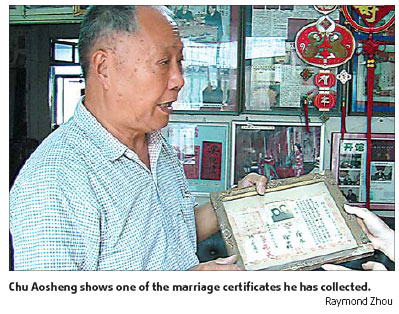Collecting scraps of history, one certificate at a time

In the past 150 years China has made huge progress, but you can't tell from the evolution of marriage certificates. Actually, the written testaments of holy matrimony have got less imaginative over the century and a half.
That is the conclusion many would draw from viewing a collection of some 800 marriage certificates, owned by Chu Aosheng.
Chu, a 70-year-old collector in suburban Yixing, can tell you everything about any aspect of a marriage document and has the original to prove it.
In the first half of the 20th century, marriage certificates tended to have bright colors and auspicious drawings, some of which look like elaborate paper cuts. In the second half, the patterns got simpler with red flags and Chairman Mao Zedong's portrait. During the "cultural revolution" (1966-76), it reached a ridiculous extreme, when political sloganeering overwhelmed the true intent of the document.
Despite political upheavals, the initiation of a marriage always reflected a joyous occasion, one might think. Not so, says Chu.
A 1909 certificate he has found shows two parents, together with three matchmakers, selling their 6-year-old daughter as "an under-aged bride" to be raised up by her husband's family and married later. The price was 18 taels of silver. It was a piece of paper drowning in tears.
The most fanciful certificate is one from 1892. It is covered with a silk cloth and embossed. Strangely, it does not list the bride and groom's names, but instead their dates of birth and the zodiacs. "It was not issued by any institution because at that time marriage was totally determined by parents," Chu explains.
Chu also collects divorce papers. Some from the early 1950s list the reason as the men "having younger concubines", something people can relate to nowadays.
Marriage certificate is just one category in the vast collection Chu owns in his cramped 87-sq-m apartment, used as a warehouse. He also has two on-going exhibitions, one in a museum in a downtown park, another in the neighboring city of Changshu.
"I change the exhibits every year, but one hall can display only a fraction of what I have," he regrets.
Chu is an unlikely collector. There are three prerequisites for being a private collector, he says. One must have the knowledge, time and money. "I was a teacher before I retired, so I don't have the financial means." But he makes it up with knowledge. "I rarely spend more than 2,000 yuan ($269) on a piece. That limits what I can afford."
But it also forces him to find the surprise bargains. "I take up what others discard out of ignorance. You'll be amazed how many people are oblivious to the treasures in their possession."
Right after 1949, many people sold their old coins as waste metal to be recycled. Still a teenager, Chu would buy big baskets of them and sift through them for collectables. He also took a liking to cigarette cartons.
"My hobby was born out of natural inclination. Nobody influenced me."
With the tumultuous "cultural revolution", his collection was confiscated and possibly destroyed. When he took up the hobby again in 1985, coins, like jade and bronze, were "beyond me", because they were financially prohibitive. He turned to items such as legal documents and records of certain events. Most notably he has been amassing marriage certificates, leases and invitations, among other things that are part of "folk custom".
Of the 20,000 items he has collected, a plaque that Emperor Xianfeng (1831-61) gave to one of his concubines is Chu's most prized possession. He got it for only 500 yuan ($67). "The seller did not know what it was," Chu says.
But nowadays, with television shows hyping everything old, such bargain discoveries are increasingly rare. Private collectors equipped with little money but boundless enthusiasm and piercing insight have a harder time as more people pour tons of money into the hobby.
"I have a circle of friends nationwide with whom I exchange tips and barter items. But we never go shopping together because we don't want to drive up prices," he says.
Chu is somewhat of a celebrity in his hometown, but he is far from the only private collector. There are people who hoard all kinds of unique things, such as precious stones and odd-shaped rocks.
"People here take pride in hobbies that cultivate taste and culture," Huang Bo, an official with the city government, says. "They help make Yixing into a town that appreciates education and knowledge."
(China Daily 11/20/2007 page19)














